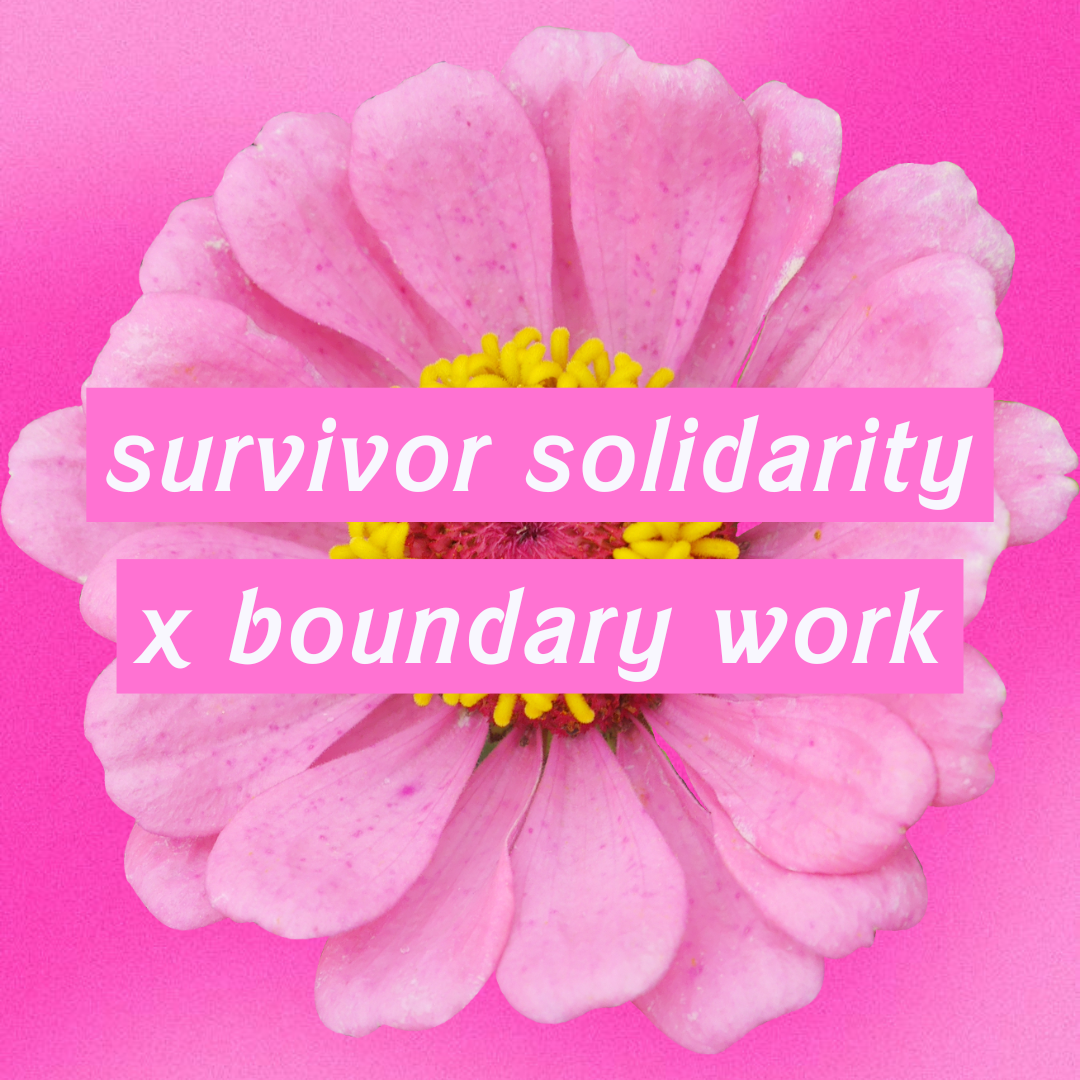survivor solidarity & boundary work: reflection prompts, tools, and resources
today's post is about boundary work when we're showing up for & supporting survivors! below, you'll find some of my thoughts, reflection question prompts, & even a tool to support you 🥰
fwiw, my hope is always that this newsletter is supportive, helpful, & healing. as always, take what works, adapt what's useful, & leave the rest behind.
many of us have a tendency to overpromise what we can offer, especially if we’ve struggled with people-pleasing. likewise, many of us will make offers of care without checking in with ourselves & our own personal capacity. these tendencies are like, a perfect storm, for creating resentment, burnout, & even retraumatization for survivors.
this is why we need to talk about the importance of boundary work, including checking in with our capacity, when we’re showing up for survivors.
as survivors, we’ve often been let down or failed by the people who were supposed to help us. i know this is definitely true for me. so, i started trying to build a community of care, a constellation of folks in my life who could make support more sustainable by spreading it out.
this approach also centers self-sovereignty for both myself & my community. i’m able to name what would feel supportive for me - & what wouldn’t. i’m able to place boundaries around cops, wellness checks, & carceral mental health care (which some folks ended up ignoring + violating but that’s a story for another day). the folks supporting me could also choose how they showed up, how often, & to what extent.
which brings me back to overpromising care. when this happens, we have the best of intentions. but what often ends up happening is we fail to keep the committments we’ve made, feel guilt &/or shame about it, then check out or even ghost the survivors we’re supporting.
& as someone with abandonment shit, this isn’t fun. what initially was a well-intentioned offer of support turned into a situation where people i cared about & even loved just like, checked the fuck out, failed to communicate with me, & left. sometimes, shit like this makes me wonder if reaching out & asking for support is even worth it, given how often this happens.
what could happen instead? what other possibilities are there?
our boundaries & capacity can & will change; we need to not only acknowledge the potential for this to happen but to plan for it.
below are some reflection questions/prompts i use that i hope you find supportive. as always: keep what feels helpful, adapt what you can, & leave the rest behind.
REFLECTION PROMPTS ON BOUNDARIES, CAPACITY, & SURVIVOR SOLIDARITY
💖 what will i do when i realize i’ve overpromised?
💖 how will i communicate that i’ve overpromised?
💖 how will i repair any relational rupture that’s occurred as a result?
💖 how will i tend to my boundaries when i’m supporting survivors?
💖 what are my boundaries when i’m offering support?
💖 what do i need to be able to offer support?
💖 how will i know my capacity is changing or has changed?
💖 can i schedule regular check-ins with myself or similar opportunities for personal reflection & reassessment
💖 how can i communicate my changing capacity or boundaries with tenderness, care, & transparency?
SURVIVOR SOLIDARITY SUPPORT MENU: A CAPACITY CHECK-IN CARE OFFER TOOL
another way of showing up for survivors while honoring our own boundaries & capacity is to create a survivor solidarity support menu. this is a way of making care offers to survivors by checking in with our care capacity & acting in alignment + with ease.
it’s a 3-step process to create & helps us offer care to survivors that fits within our current capacity with more ease & self-trust & alignment.
💖 create a list of the ways you can show up for survivors in your community. for example, my list might include: tarot readings + card pulls, book recs, holding space for feelings without judgement, listening to venting, helping make a community care plan, sending snail mail or care packages, check-in texts/phone calls, co-create dates, etc.
💖 create 3 columns & label them: low capacity, medium capacity, & high capacity.
💖 map the actions, your care offers for survivors, from your list in the first step into the appropriate columns based on what capacity you need (i.e. to be able to offer each of your acts of care & support).
RECOMMENDED READING
boundaries & protection by pixie lighthorse is a short + impactful collection of accessible & actionable prompts on starting conversations about & setting boundaries, especially for those of us who are recovering people-pleasers. read it for tangible strategies for improving your boundaries & friendships, one conversation at a time.
OUTRO
being in relationship with one another can be really hard but it doesn’t have to be. we have the ability to learn new skills to better be in community with one another, to be present with each other, & to both offer & receive support in ways that feel sustainable, generative, & even pleasurable. community care can be a source of joy, healing, depth, pleasure, & liberation.
i hope that this quick post has been supportive for you, sweet friend.
let me know what you think by replying to this email! do these reflection prompts/tools feel helpful? are they something you’ll use going forward? what do you need more support with when it comes to showing up for survivors or boundary work?
THANK YOU, BBY 💓
whether you order a zine, engage with or share my posts on social media, or forward this newsletter to a friend, thank you so very much for supporting my work as a disabled nonbinary queer femme survivor & artist!
LINKS
sign up for Karina’s newsletter
follow Karina on Instagram

